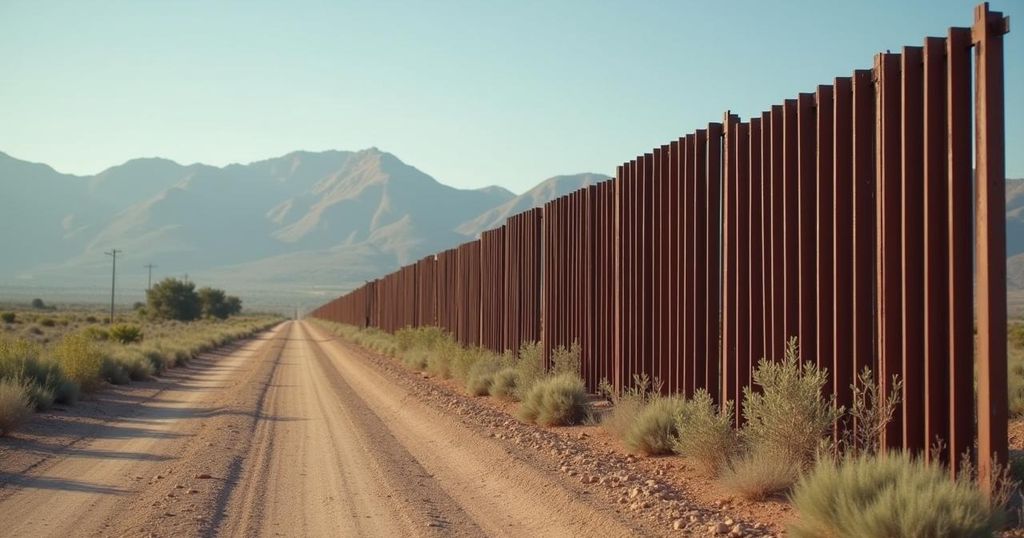Mexico’s Response to U.S. Election: Intensified Border Enforcement and Migration Challenges
As the U.S. election approaches, Mexico has heightened border enforcement measures in an unwritten agreement with the Biden administration, reducing migrant crossings significantly. This cooperation serves Mexico’s economic interests and aims to minimize political fallout during the electoral period. The landscape illustrates the challenges faced by migrants in a Mexico increasingly tightening its immigration policies under the current government, while both nations navigate the intricate relationship between migration and electoral politics.
As the U.S. presidential election approaches, Mexico has intensified its border enforcement measures, significantly reducing the number of migrants reaching the U.S. border. Analysts attribute this decrease to an unwritten agreement between the Biden-Harris administration and Mexico, aimed at stabilizing border conditions to protect Mexico’s economic interests and prevent political repercussions during the upcoming election cycle. Illegal crossings have been a focal point in Republican campaigns, particularly for Donald Trump, while Democrats, notably Kamala Harris, find immigration a challenging issue. The newly elected President of Mexico, Claudia Sheinbaum, is acutely aware of the potential impact of migrant flows on the American electoral process. According to Arturo Sarukhán, Mexico’s former ambassador to the United States, while there may not be an explicit intervention in U.S. voting, Mexico acknowledges its significant role in shaping the election context. Hence, Sheinbaum is likely motivated to prevent a surge in migrant traffic just as voters head to the polls. Statistics indicate a drastic decline in migrant encounters at the U.S. border, plummeting from nearly 250,000 in December 2022 to fewer than 60,000 recently. Meanwhile, Mexico has witnessed a marked increase in migrants seeking entry into its own territory, with its immigration agency reporting a 160% rise in encounters during the initial months of the year. This multifaceted scenario underscores the challenges faced by migrants, such as the Sarmiento family from Venezuela, who found themselves stranded in Mexico City after an arduous journey, thwarted by stringent immigration controls. The U.S. and Mexico’s collaboration on migration control intensified following a critical phone call from President Biden to Mexico’s leader just before Christmas, 2023. The urgency stemmed from the alarming increase in migrant numbers which threatened to disrupt American communities and the Democratic Party’s standing ahead of elections. Subsequently, U.S. officials made a swift visit to Mexico City to present demands for enhanced cooperation on immigration enforcement. The U.S. wielded economic leverage by threatening to impede trade, a crucial component of Mexico’s economy, which relies heavily on exports to the U.S. In response to American pressures, the Mexican government imposed new visa requirements and restricted asylum processes, intensifying enforcement against migrants attempting to traverse the country. Consequently, migrants often find themselves on a ‘carousel’ of enforcement, being apprehended and rerouted back to Mexico’s southern states, diminishing their chances of reaching the U.S. border. Political observers highlight that Mexico has effectively turned its immigration policy into a tool of leverage, a move that raises ethical concerns regarding the treatment of migrants. While the U.S. has economically supported assistance programs in Mexico, it remains unclear how closely it endorses Mexico’s stringent enforcement tactics. Looking ahead, the stability of the current enforcement strategy under Sheinbaum’s administration remains uncertain, as she has just appointed new leadership in immigration affairs. However, informal commitments from the U.S. suggest a continued alignment of immigration policies between the two nations as they navigate the intricate dynamics of migration and electoral politics.
The topic at hand discusses the evolving immigration policies between Mexico and the United States leading up to the 2024 U.S. presidential election. The Biden administration’s approach to border security has shifted significantly, relying on Mexico to control migrant flows amid political pressures from Republican candidates and internal party concerns about immigration issues. The dynamics of this relationship emphasize Mexico’s economic interests and political calculations as it seeks to manage the complex influx of migrants while maintaining treaty obligations and humanitarian considerations.
In summary, Mexico’s robust enforcement measures against illegal migration, triggered by a tacit agreement with the U.S. government, represent a significant shift in the bilateral approach to immigration. As migrants face increased challenges and stringent controls within Mexico, the implications for both nations’ domestic politics become evident. The approach taken by the Sheinbaum administration appears geared towards maintaining order at the border to avoid adverse political consequences in the U.S., highlighting the intricate interplay of migration and electoral politics. How this enforcement regime evolves in the future remains a pivotal issue for policymakers in both countries.
Original Source: www.usatoday.com




Post Comment